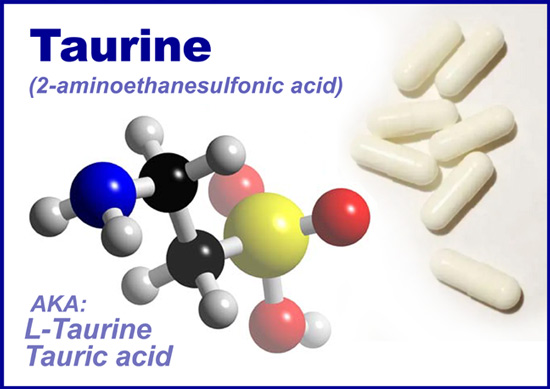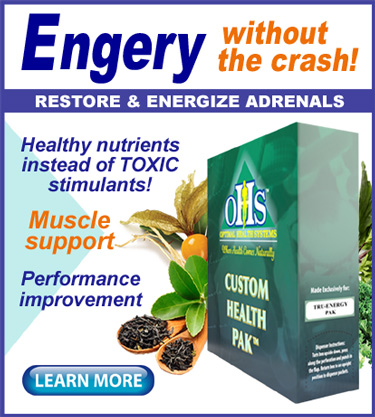If you’re a workaholic you might recognize taurine as an ingredient in the energy drink you picked up at the local convenience store.
If you’re a pro athlete you might recognize taurine as one of the energy-enhancing supplements provided by your team nutritionist.
However, if two studies conducted during the past year are any indication, taurine may end up being the go-to supplement for offsetting the effects of aging—and even extending the length of one’s life.
What is taurine?
Taurine is a naturally-occuring amino acid that has many vital roles in the body. Some of these roles include supporting the development and function of skeletal muscle, supporting immune health, keeping the eye’s retina healthy, and ensuring efficient nervous system function.
Unlike other amino acids, it is not one of the typical “building blocks” of protein. In fact, since it is not used to build proteins in the body, some scientists argue that taurine is not a traditional amino acid. Wikipedia refers to it as “a non-proteinogenic amino sulfonic acid.” Other sources list it as a “conditionally essential amino acid”—meaning it becomes essential only in times of illness and stress.
Regardless, taurine makes up 0.1% of total human body weight—a substantial amount considering the vast number of compounds in the human body—so it is clearly a vital component of human health.
The name “Taurine” comes from the Latin taurus, meaning bull or ox, as it was first isolated from ox bile in 1827 by German scientists. It is now known taurine is also a major constituent of bile in humans, and can be found in the large intestine. It is also concentrated in the brain, eyes, heart and muscles.
The main sources of taurine are animal proteins such as meat, seafood, and dairy. The body can also synthesize taurine from other nutrients.
Related:
Taurine and eye health
According to a new systematic review, dietary supplementation with taurine—an amino acid that has been shown to provide a protective role in the retina—is pivotal in reducing visual fatigue and for the maintenance of ocular health.
The Chinese researchers noted that previous studies have long-established that depletion of taurine levels in the human body typically impair retinal function and even lead to serious eye conditions.
Details of the study were published in Nutrients in March 2023.
Study 1
Based on the compound’s known antioxidant and anti-inflammatory properties, researchers at the University of Sao Paulo in Brazil set out to evaluate the effects of taurine supplementation as potential anti-aging therapy for women.
The study, a double-blind randomized clinical trial, included 24 sedentary women between the ages of 55 and 70. The study participants were administered either 1.5 grams of taurine or a corn starch placebo daily over 16 weeks.
Plasma samples collected before and after the intervention were tested for taurine and oxidative stress markers—antioxidant enzymes superoxide dismutase and glutathione reductase. These markers are considered the best indicators for “true age” and life expectancy.
At the end of the 16-week trial period the researchers concluded that the taurine supplementation had provided considerable benefits as far as lowering all the oxidative stress markers being measured.
“We believe that taurine supplementation may enhance the antioxidant defense system and could be a viable nutritional strategy to prevent oxidative damage induced by the aging process,” the researchers wrote in the study summary.
The study was published in the journal Nutrition in September 2022.
Study 2
The second study, published in the journal Science in June 2023, was a series of animal trials. The findings showed that taurine supplements were able to improve healthy lifespans in worms, rodents, and non-human primates.
Scientists have previously shown that taurine levels in both humans and animals decline with age. In humans, taurine levels were documented to decrease by over 80 percent throughout the lifespan.
To delve deeper into this phenomenon, researchers from National Institute of Immunology in New Delhi, India and Columbia University, New York measured blood taurine concentrations at different ages in various animals. The researchers then investigated whether taurine supplementation could reverse the decline in taurine levels—and if it impacted lifespan.
The researchers found that supplementing with taurine increased the median lifespan of worms by as much as 23 percent and in mice by as much as 12 percent. In mice, oral taurine supplementation was also associated with improvements in strength, coordination, cognitive functions, and key markers of aging.
In primates, the study also revealed positive effects on bone, metabolic, and immunological health in middle-aged primates rhesus macaques.
The researchers cautioned that, while these findings suggest that taurine supplementation could be a promising anti-aging strategy for humans, it may be a bit early to start gobbling it down in expectation of a life extension “guarantee.” However, the studies do reinforce the already-proven benefits of taurine, and the popularity of the supplement form of the nutrient is sure to only grow.
You can find taurine in the Tru-Energy Pak at Optimal Health Systems. Click the banner ad on this page to learn more.
– –
Sources: Nutrition (via ScienceDirect.com), Science.org.


